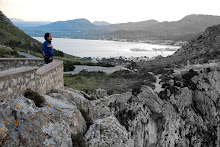Tuesday, March 31, 2009
I guess people read my blog
I guess people read my blog
Thursday, March 19, 2009
Beauties and Beasts: there is always more than one side...
Beauties and Beasts: there is always more than one side...
Sunday, March 15, 2009
Dan Halton: Show me the other side of the story!
Dan Halton: Show me the other side of the story!
Monday, February 9, 2009
per secula seculorum?
I just read a story on Eluana, an Italian woman who has been in coma for 17 years. She died today while in the Italian congress her life was in debate. Mr. Berlusconi (cheered by the Catholic church) was trying to pass The “Eluana law” that prevents hospitals and families to take "a person's life away". What is life, I ask? What makes Eluana’s life… a life? There is no universal definition of life. Scientists define it in broad terms to avoid unequivocal assumptions. If life is defined in relation to a natural course that exhibits certain biological processes and chemical reactions, Eluana’s life would be considered “artificial”. If she has been attached to a machine that feeds her and breathes for her, and her brain is completely or partially damaged, and she’s been asleep for almost two decades in what science calls a "coma" (a state of “deep unarousable unconsciousness")… how is this type of life not artificial? Should the state decide on these matters? How long is too long to wait for an awakening? How short is too little? “We” (the people) should have the right to decide on our own bodies and lives. What happens to our bodies after we "die" should not be regulated by the State (or by others). If these machines did not exist she would’ve died a good number of years back. How can the Church, and their believe in an Almighty God, apply “scientific” technology to their convenience and deny it when it suits them? The life of Eluana becomes a “diversion”, but not as a past time or amusement but as something that distracts the attention of the public from bigger issues. Eluana’s body is not tight to an artificial machine anymore, it will disintegrate as the rest of her once did.
per secula seculorum?
Saturday, January 31, 2009
The Reader
The Reader
De tú a tú
Dice la niña, hoy una amiguita cumple años y mañana otra amiguita cumple años pero a la otra amiguita no le tenemos sorpresa, ¿tú sabes qué le podemos dar? Ella es vanidosa, tres cosas que a ella le gustaría, tu elijes, la número uno es una lámpara brillante, la dos una bufanda peluda con espejo y con gafas de plástico, y la número tres, déjame pensar, un bebé.
- Yo le digo, si yo fuera la niña vanidosa pediría la lámpara brillante (para verme mejor).
- Bueno ya me tengo que ir, dice la niña, mi pregunta es, ¿cómo se inventó la nieve?
- La nieve es lluvia que se congeló en un día muy frío.
- ¿Cuál fue el primer hombre que descubrió el fuego?
- El fuego es un rayo que cayó sobre un árbol en un día de tempestad, el árbol se encendió y los habitantes de la región, donde vivía aquel árbol en llamas, se llevaron cada uno un pedacito de fuego a su casa... lo pasaron de unos a otros por años... hasta que alguien se inventó los fósforos...
- ¿Quién es la primera persona que descubrió a Rusia?
- Rusia... hmmm... ahí sí que me corchaste... vamos a tener que investigarlo juntos.
- Bueno chao, dice la niña.
De tú a tú
Thursday, January 29, 2009
Revolutionary Road
Revolutionary Road
